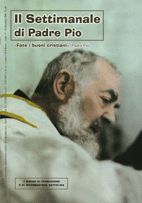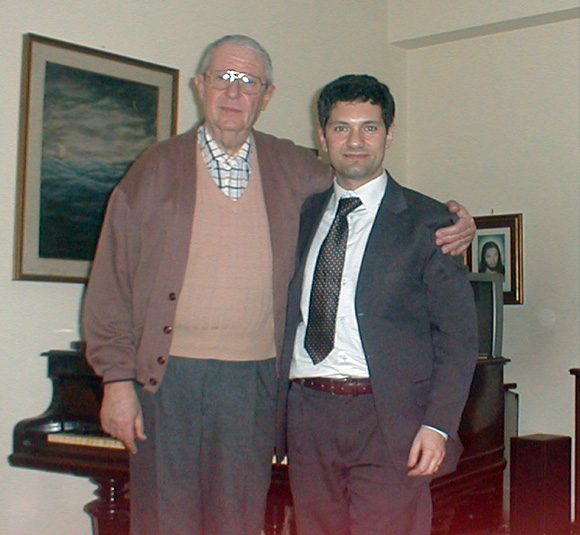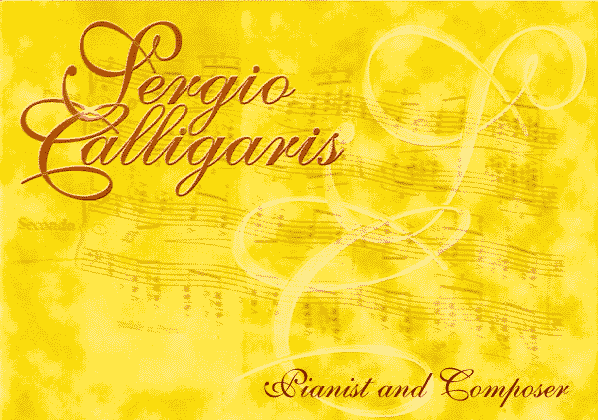 Il Settimanale di Padre Pio, Year V - Nr.49
Il Settimanale di Padre Pio, Year V - Nr.49
(Associazione «Il Settimanale di Padre Pio»)
10th December 2006 (page 24):
Meeting Sergio Calligaris
by Maurizio Brunetti
Sergio Calligaris, pianist and well known Argentinian composer, tells us about his
Opus 47, a Panis Angelicus for piano and mixed choir or vocal quartet, composed
in 2005 and dedicated to Pope Benedict XVI, to whom he tributes a deep veneration.
In order to withstand the tendency to consider obsolete what was written
just…yesterday, we would like to recover a little pearl in the mare magnum of
John Paul II's Teaching. It deals with the "Letter to the artists" published on
April 4th 1999. In that occasion the Holy Father defined the artists "genial builders
of beauty" and invited them to "to rediscover the spiritual and religious depth
that has characterized in every time the art in his noblest expressive forms." To be
quite honest this definition and this invitation, together with the final wish to
contribute "to affirm an authentic beauty that, almost reverberating the Spirit of
God, transfigures the subject, opening minds to the sense of the eternity", seems a
bit eccentric, since we lives in a world that doesn't cover with ridicule, but rather
applauds and economically gratifies, those people that expose their own defecations as
artistic items!
Anyway, as a matter of fact, that Letter had and has some interlocutors: men putting their
own creativeness to the service of beauty or, as John Paul II precisely said, people
seeking with impassioned devotion "new beauty epiphanies, to make the world a
gift of them".
Among these interlocutors, we believe there is, in fact, the pianist and composer of world
fame Sergio Calligaris. Born in Argentina, after some years spent in USA as pianist and
music teacher, he is now an Italian citizen. Since 1974 he lives in Rome.
Maestro, your opus 47 is a Panis Angelicus for piano and mixed choir or vocal
quartet (ad libitum). Could you please describe it for us?
I have finished to compose this work in 2005 to Rocca di Mezzo, the place in Abruzzo
where I use to spend the Summer. I find in the beauty of this place a fertile source of
inspiration. The theologian dr. Silvano Quattrin had submitted me the Latin text. He told
me, in particular, that the second strophe of this Thomas Aquinas's hymn had never been
set to music. I accepted the challenge and tried to describe in music the human tension ad
lucem quam inhabitas, to the eternal contemplation of God in the Heaven. The existing
difficulties (because of the sin) are all overcame thanks to Eucharist.
In other interviews, you declare to be a Catholic and a devotee to Our Lady. You
also boast a thirty years collaboration with the Radio Vaticana. Do you agree with
Domenico Bartolucci, recently returned to the direction of the Chapel Sistina choir,
around the lack of liturgical sense in contemporary composers?
Surely Maestro Bartolucci rightly stresses the necessity of a return in the liturgy of
the music by Palestrina and of the Gregorian chant, an extraordinary tool to make
perceivable the world of the Spirit. It could be true that not every Parish has at hand a
choir able to sing well sophisticated music, but the excuse is not good enough to propose
bad music...badly sung! Certain contemporary church lyrics seem to be the rough copy of
thirty years old popular music, and their mediocrity is too often incompatible with the
Landlord dignity!
It is also true that the sacred music of contemporary composers, think for instance to the
Polish Requiem by Krzysztof Penderecki, is characterized by a complexity that
perhaps makes it unsuitable to an execution within the liturgy. My own Requiem
doesn't make exception. I finished it in 1984 after my mother's death. It is a composition
for mixed choir, three male soloists, two pianos and percussions. It has a wide breath and
it is demanding both for the choir and for the performers, challenged by passages of
transcendental difficulty.
Also the Panis Angelicus has a very dense piano writing…
And that's the reason why I have made ready a version of the same piece for piano solo.
The lyric moments are sometimes alternated with dissonant passages. I believe nevertheless
that, when augmented fourths and a chromatism typical of post-hindemithian musical
experiences emerge in a non-completely atonal harmonic pattern -that is typical in my
works- the listener doesn't lose his bearings. If you listen the excerpts available on my
website you will discover that I'm not among those that maniacally avoid to use minor or
major chords, being afraid to be charged as traditionalists!
What has pushed you to dedicate your work to the pope Benedict XVI?
It is quite natural that a musician like me feels particularly tied up to a Pope that
decided to finish his very first Pontiff day playing Mozart at the piano!
Beyond the wisecrack, and the deep veneration that I render to the Pope as Catholic, I
feel the Holy Father's style incredibly in tune with my aesthetical parameters. Just as in
many texts of the Doctors of the Church, in his writings and in his speeches the anxiety
to evangelize is indissolubly tied to the formal rigor and a concise reasoning! I believe
that the artistic tension toward the realization of beauty can be realized only if the
poetic inspiration is supported by logical and coherent forms. That's why my music is
overall-thought and meticulously respects the counterpoint logics.
Obviously, when you are successful in communicating an aesthetical emotion to listeners,
there is always the risk to displease someone that would have appreciated a more
experimental piece, perhaps more "modern"; I have to say nevertheless that the
public rewards this attitude of mine inspired to sincerity, love my music and warmingly
applaud at the concerts. Something similar happens to Benedict XVI when he escapes the
modern and not always immediately comprehensible ecclesialese: a style certainly
able to bevel the angles, to sweeten, to offend no-one, but it is above all...boring!
Joseph Ratzinger, instead, together with brave bishops like Carlo Caffarra - who was
involved in the genesis of my Ave Verum op. 42 - prefers to propose us the whole
Truth, not censoring those aspects that are more distant from the mentality of modern
world: a style that will displease some theologian à la page and some smart
opinion-makers, but at the same time it will warm the hearts of all believers' hearts,
exalting, also to non-believers palates, the sapidity of the teachings of the One of whom
Benedict XVI is the Vicar on this Earth.
(English text entirely written by the Author)

Maurizio Brunetti at Sergio Calligaris' home
(Rome, 24th March 2006).
Maurizio Brunetti is a mathematician and belongs to the Faculty Staff of the
University "Federico II" of Naples - Faculty of Engineering as Researcher. He
got the Doctorate in Italy and the Ph.D. at University of Warwick (UK). He is an algebraic
topologist. His scientific works appeared on several specialized journals, and were often
presented at international conferences.
Contributor to Il Settimanale di Padre Pio since its first issue, he published several
articles on the relationships between faith and science.

